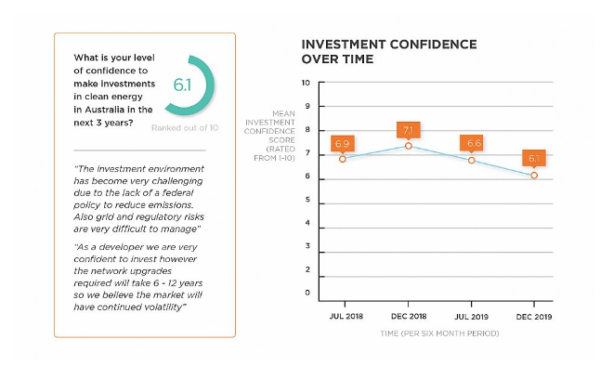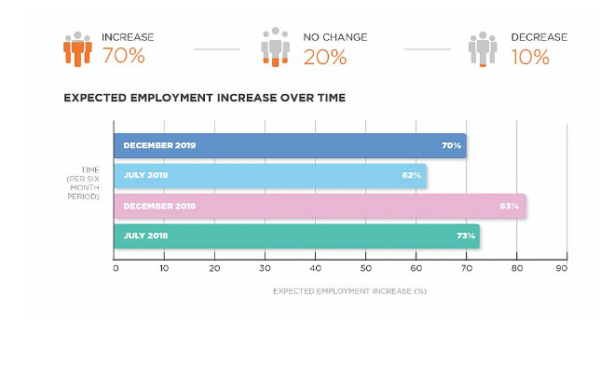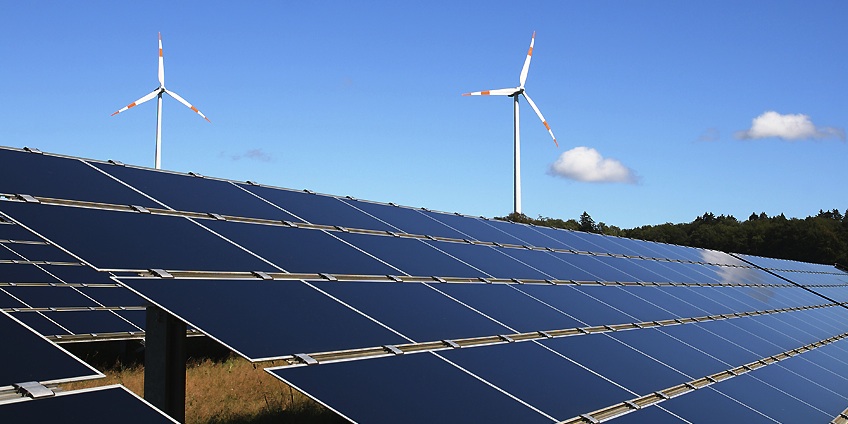Confidence in new clean energy investment has fallen to a record low after the remarkable year of 2018 shattered all records in terms of investment in renewables and capacity additions. According to the Clean Energy Outlook confidence released by the Clean Energy Council (CEC), the clean energy sector in Australia is struggling with the industry continuing to cite grid connection and transmission concerns and a lack of Federal Government policy as the biggest challenges.
The survey run by the CEC among 70 CEOs and senior executives across the renewable energy and storage industry shows confidence to invest in new clean energy projects in the next three years fell to a record low of 6.1 out of 10, down from a 7.1 recorded just 12 months prior. “As we have consistently said, without strategic and holistic reform of the Australian energy market, we are going to continue to see confidence in new clean energy investment continue to fall,” CEC Chief Executive Kane Thornton said.

Difficulties in finalizing grid connection amid strenuous demands that the Australian Energy Market Operator is placing on renewables developers have delayed a number of large-scale projects across the country, undermining their economic viability. This has even caused developers to walk away from projects, or bear additional expenses to install components, such as costly synchronous condensers, in order to improve grid strength.
Notwithstanding the grid challenges, Australia has seen a breakneck speed and scale of project commitments over the last couple of years, largely driven by the 2020 Renewable Energy Target. With the target now officially achieved and surpassed by a substantial margin, a policy vacuum beyond 2020 has taken its toll on investment confidence.
In September the CEC published a report showing investment in renewable energy projects had slowed to levels not seen since the prime ministership of Tony Abbott as a result of policy uncertainty and mounting regulatory challenges. According to the report, new clean energy investment has slowed significantly in 2019, with average quarterly investment in new generation capacity just over 500 MW per quarter compared to over 1600 MW per quarter in 2018. This reflects a reduction of over 60% from 2018 levels.
“Australia has abundant natural resources and huge potential for renewable energy generation, but the industry has been plagued by policy and political uncertainty at the federal level for several years and we are now starting to see the impact of this,” Thorton said.
Other important challenges identified by the industry were also related to transmission, including under-investment in network capacity to address congestion and constraints, and concerns about marginal loss factors (MLFs), as the third and fourth biggest challenges in the survey. However, the Australian Energy Market Commission’s decision earlier in November to leave MLFs unchanged rejecting industry calls to simplify the methodology of assessing transmission and network losses is expected to further deteriorate investment confidence.
Finally, the industry is also struggling with unjustified government intervention in the energy market and the lack of certainty about timing of exit of coal-fired power stations, the survey found.
But despite the immense challenges, around 70% of respondents said they expected the number of people they employed to increase in the next 12 months. Industry leaders were slightly more optimistic than they were in the last survey taken in July.

“This reflects the incredible gains the industry is making, despite the significant issues around transmission, grid connection and energy policy,” Thornton said. “While some of the survey results are certainly disheartening, I hope that it will serve as a wake-up call to governments and regulators to begin taking the urgent action needed to boost confidence and deliver an affordable, reliable and clean energy system for all Australians.”
This content is protected by copyright and may not be reused. If you want to cooperate with us and would like to reuse some of our content, please contact: editors@pv-magazine.com.









1 comment
By submitting this form you agree to pv magazine using your data for the purposes of publishing your comment.
Your personal data will only be disclosed or otherwise transmitted to third parties for the purposes of spam filtering or if this is necessary for technical maintenance of the website. Any other transfer to third parties will not take place unless this is justified on the basis of applicable data protection regulations or if pv magazine is legally obliged to do so.
You may revoke this consent at any time with effect for the future, in which case your personal data will be deleted immediately. Otherwise, your data will be deleted if pv magazine has processed your request or the purpose of data storage is fulfilled.
Further information on data privacy can be found in our Data Protection Policy.